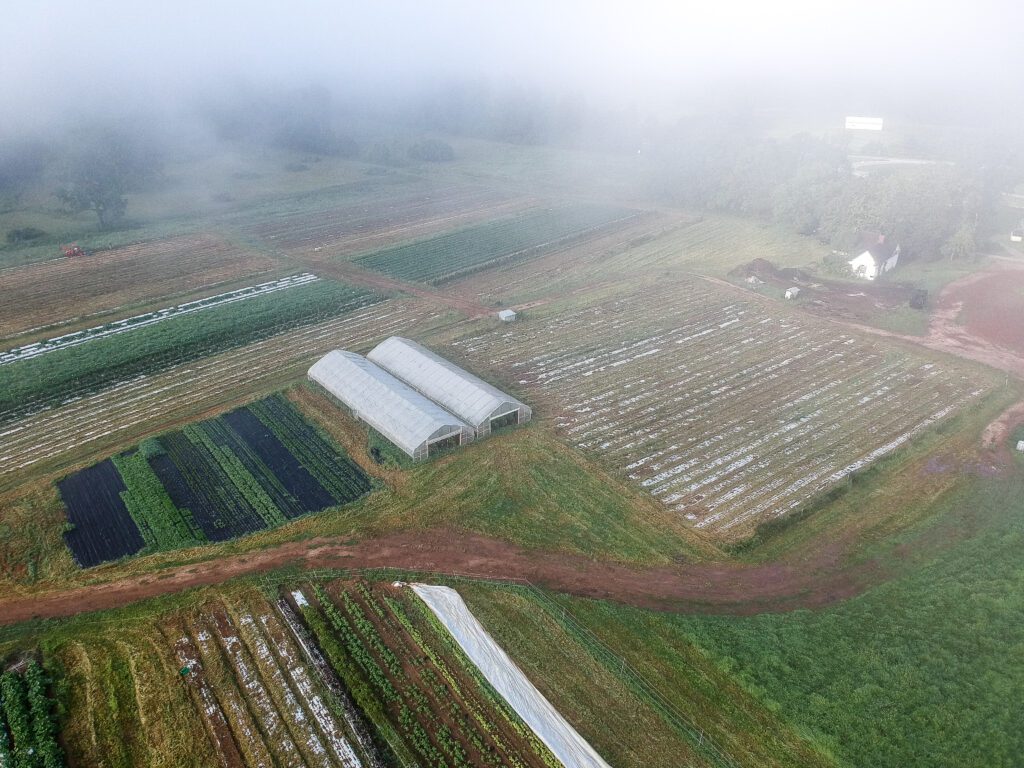On a crisp November evening in 2023, Fresh Harvest customers, staff, and suppliers gathered at Wild Heaven Brewery to celebrate the year’s bounty of local food with…you guessed it: food (and beer)! One highlight of this beautiful evening was the following conversation about Georgia’s good food movement between some of the most influential players in the local food scene. Farmer Ashley Rodgers of Rodger’s Greens and Roots Farm shared the stage with Wholesome Wave Georgia’s Executive Director, Will Sellers, and Georgia Organics’ Director of Farmer Advocacy, Michael Wall.
Read on to see what was discussed or listen to the full audio below, including an intro and big announcement from Fresh Harvest Founder Zac Harrison.
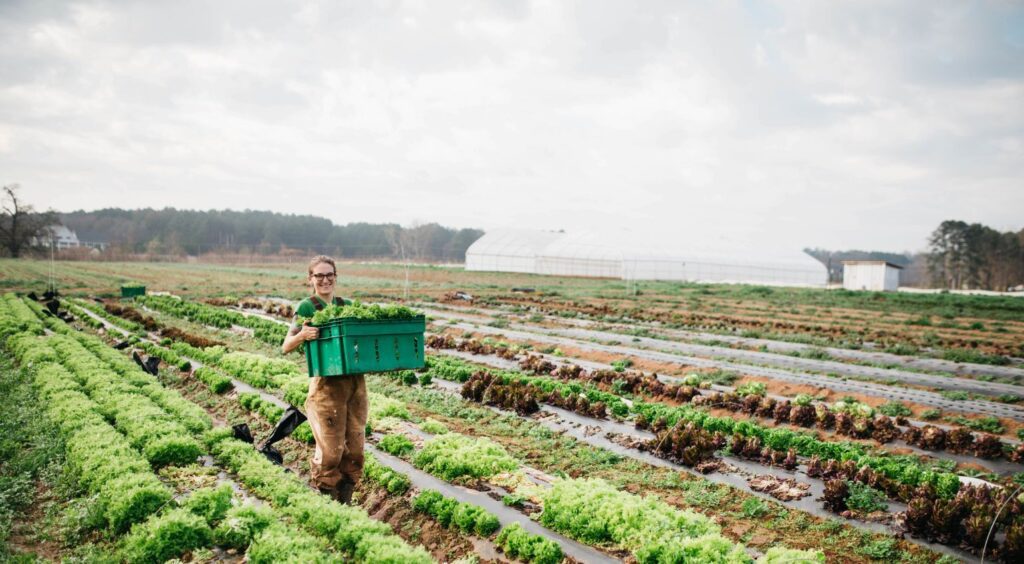
Tell us a little about yourselves and what you do
Ashley Rodgers: My farm is Rodgers Greens and Roots. We’re in Douglasville, Georgia. I have been farming for 14 years. It’s my 7th season owning my own business, and we’ve sold to Fresh Harvest for all 7 years. We grow vegetables, a little bit of herbs, and I just started raising Meishan hogs. So you can now get your Rodgers pastured Meishan pork through Fresh Harvest.
Will Sellers: If y’all haven’t heard of Wholesome Wave Georgia, we are not offended at all. We are a statewide nonprofit organization. We have 84 partners around the state. We’re in every major (Georgia) city. We’re also in small towns like Albany and Waycross.
What we do is make it so that our neighbors who are using the food stamp program can double the value of those food stamps to buy more fresh, healthy, locally grown fruits and vegetables. We’re super excited to be here. And the fact that they’ve got beer, I mean, it’s not bad at all.
Michael Wall: The Director of Farmer Advocacy is kind of a new position at Georgia Organics. Before that I was helping farmers like Ashley become certified organic and find new markets and just try to survive in a system that wanted to devour them from the inside out. And now I’m working on the Farm Bill. I go to Washington, D.C.
That’s not fun.
The fight is also not fun, but it is our fight. We’re trying to get a Farm Bill that’s fair and just for all growers, of all scales, and of all agricultural types. If this Farm Bill ever gets passed, I will then pivot to some in-state stuff around the most important topic in the history of the planet Earth: soil health.
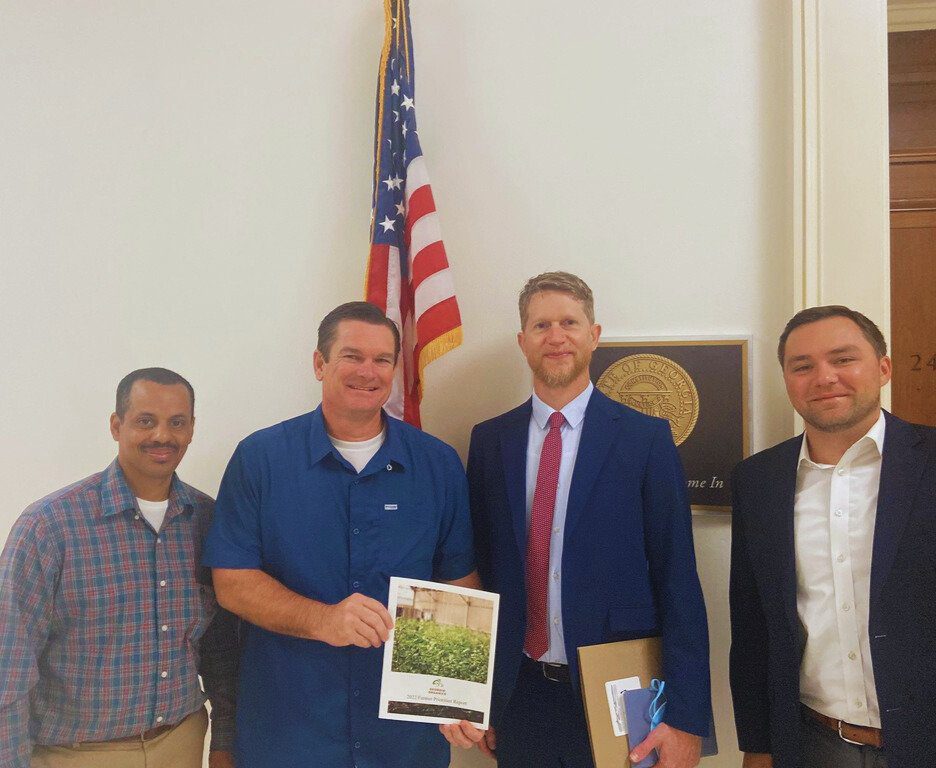
How do you define good food?
Ashley Rodgers: I’ve spent my whole career just trying to grow the best vegetables and herbs and whatever else it is that I can. But for me it’s the connection that keeps me going. It’s knowing that people are enjoying what I’m working really hard to grow and produce.
Will Sellers: We know not only is food nourishing to our bodies, it’s also a chance to connect with our families and the people we love. So at Wholesome Wave Georgia, we see our work in the food movement as really not only creating access to food, but also creating opportunities for people to be in community just like tonight. This is primal for us. This is going back to the days around the campfire. We love what you all are doing here at Fresh Harvest together, having a meal, enjoying a beverage. Telling stories, meeting new people.
Many Georgians don’t get to do that because their lives are busy. They’re going from point A to point B and the inability to stop and reflect and cook and share for those Georgians who are living on the margins is something that many of us don’t know or take for granted.
Michael Wall: My boss wants me to say organic food is good food. My board member, Eric, wants me to say organic food is the best food. And Ashley wants me to say organic food is the only good food.
The food that you can provide to your family is good food. That’s what I think. And I don’t think it’s fair for any mother or father or grandmother to hear that one type of food is better than another type of food. Even if we’ve got biases and different perspectives and values that might contradict that. That’s just how I’m answering that question tonight. In a week, I might have a different take on it, but that’s where I am tonight.
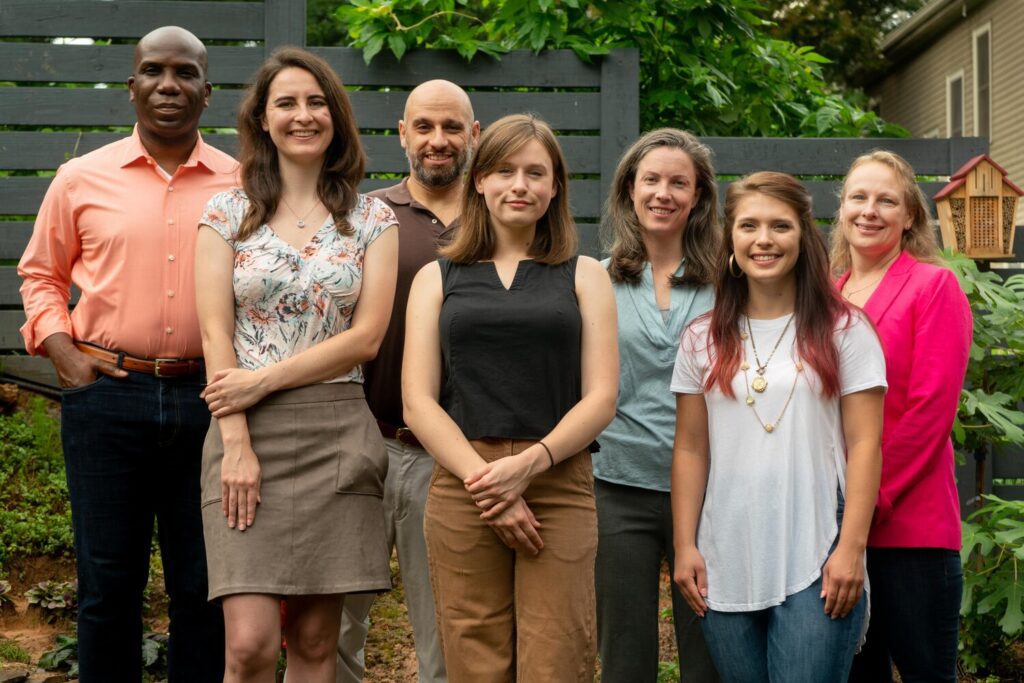
What is the biggest obstacle in your way of getting more good food to more tables around Georgia?
Will Sellers: For us it’s transportation. Actually getting to that farmer’s market or farm stand is the biggest barrier. So at Wholesome Wave Georgia, we double the value of food stamps.
Since 2019, we’ve been able to put back $1.2 million in direct investment across the state. But what we know is if Georgians had more access to transportation, that number would go up. So many of our farmers markets and farm stands that we work with are not in food deserts. They are outside of food deserts. So for someone who is on the EBT Program, just getting to that location so that he can increase his purchasing power, that is the biggest barrier.
For us at Wholesome Wave Georgia, partnership is where we lead from. Collaboration is where we lead from. Because a rising tide lifts all boats. And one of the reasons we’re so excited about the Fresh Harvest story is because you all are delivering food, which removes their transportation barrier.
So clearly, the people here understand and get it. And they’re voting with their dollars, but there’s so much more all of us can do to help other Georgians, and we’ve got a unique footprint to do that.
Michael Wall: The biggest barrier for a really just food system is the notion that there’s an us versus them. That is a lie and a myth. It’s the legend of urban versus rural, blue versus red, north versus south. Any of those things are just complete falsehoods and are used by folks to keep somebody in power and somebody else away from the power.
That’s the thing that’s keeping us from having a food system that’s fair to Ashley and fair to low income families. There’s a part of the reptilian mind that is attached to tribalism. That part of the brain, that’s what we have to kill so that we can have a really healthy food system for all of us.
Ashley Rodgers: I’m broke. It’s really hard to pay the bills. My biggest obstacle is needing more people to buy more food from Fresh Harvest, to come to market and buy food from me. To pull it instead of me pushing it. Financially it’s really hard.
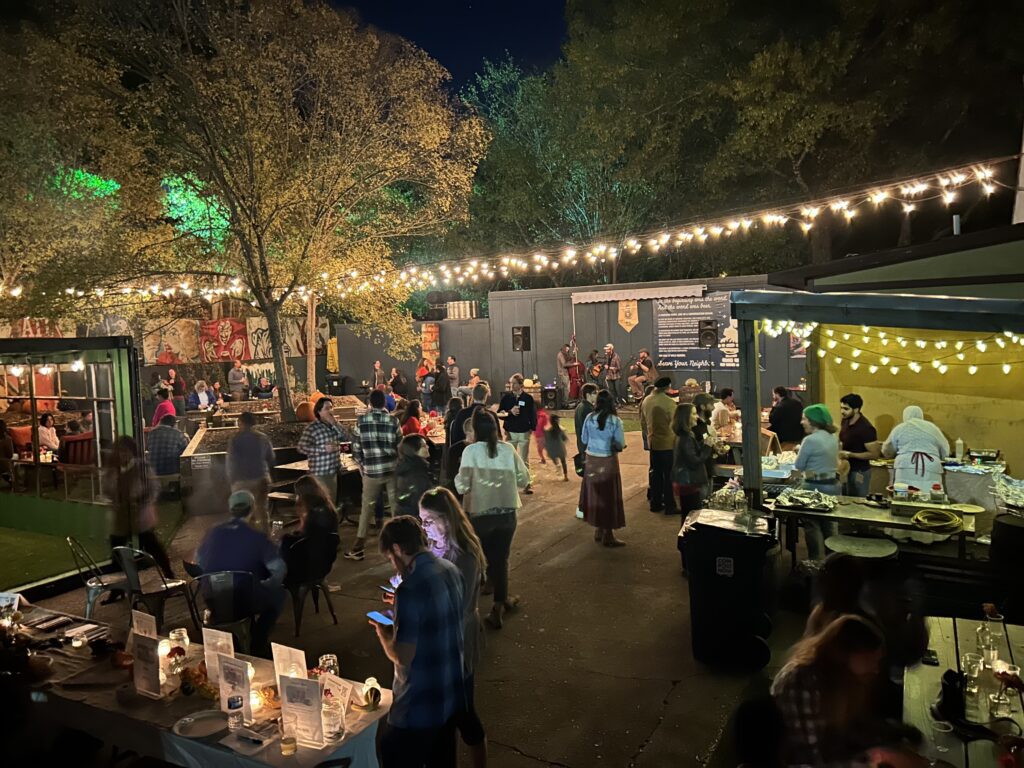
What are your dreams and visions for the future of good food 10 years from now?
Will Sellers: For us, it’s more brick and mortar partners. Brick and mortar for us means convenience stores. It means the bodega in, you know, a low access, low income area. It means the small stores that operate all across the state of Georgia. And so for us, that is a huge opportunity to expand into, but it takes a lot of education for the owner and also a lot of us doing stuff on the back end to support that owner. That takes a lot of effort and a lot of work. But with us coming up on almost 20 years in existence, we believe that we’ll be able to crack the code on that.
Ashley Rodgers: I would hope that more people can feel that connection towards food. We know the person that’s growing it or we went to the farm and saw it where it was, you know in the field like to actually know how food is grown.
I think it’s a powerful connection and I think that encourages us from a young age to seek it out. I didn’t know about that until I experienced it. But once you experience it, once you taste it, sit around the table and share it, I think that it’s almost intoxicating, right? But in this really good way. And I want everyone to be able to experience that.
Michael Wall: That’s a good dream. It should be delicious.
I predict that there will be more organic farms in Georgia. There will be a lot more organic acreage in Georgia. I’m concerned that all of that acreage is going to belong to fewer, more consolidated, big business type, large scale organic farms. But we’ll have plenty of organic supply and a lot of that soil will be better protected if those things happen. A trend that I think will continue is climate smart agriculture, which is just a euphemism for soil health, a euphemism for organic agriculture, that’s going to keep growing.
I think the next generation of consumers and the next generation of advocates within institutions are really becoming more aware of the link between agriculture and climate change and how good agriculture can mitigate climate change. And that’s what I’m hopeful about.
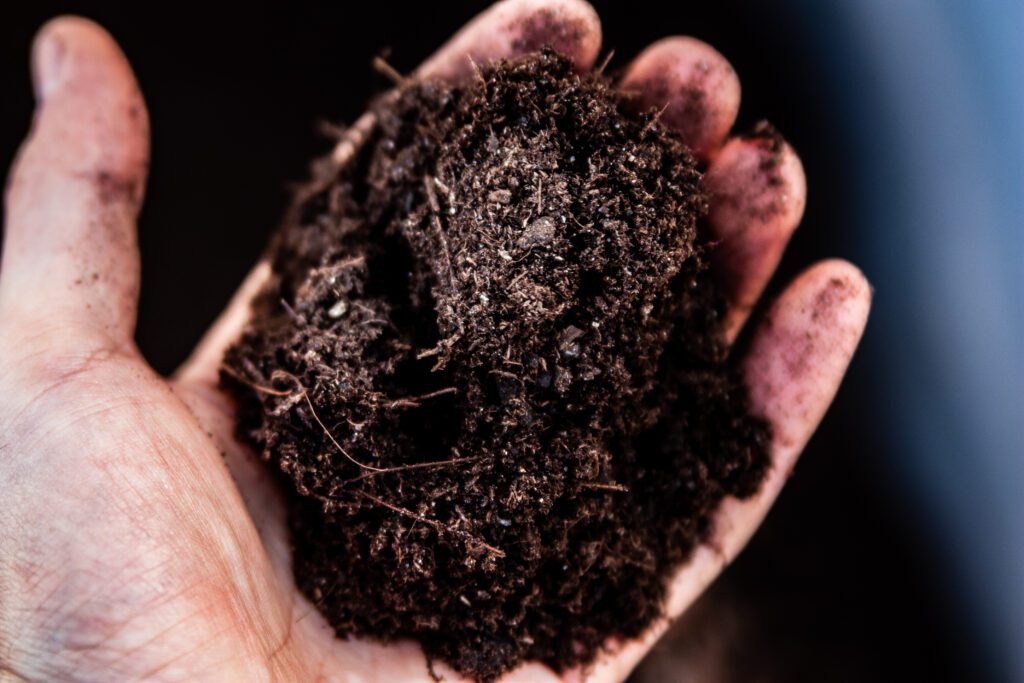
How would you advise listeners and readers to get involved?
Ashley Rodgers: Just keep being Fresh Harvest customers. Keep buying more. Buy meat, buy eggs, buy anything that you can, because your food dollars really do matter.
Michael Wall: I’ve been around the country talking to farmers in the good food movement and the organic spaces and the food access spaces. There is not a company in this country that is like Fresh Harvest. There is nothing. There is no model. They are the model. You know, Fresh Harvest customers really are participating in a system that’s more just and is righting a lot of wrongs. I honestly believe that. Keep buying from Fresh Harvest and also go to the farmer’s markets and buying directly from farmers. Do both.
So, there are companies in Atlanta that support farmers, and I’ve heard many farmers complain about all of them except for Fresh Harvest. I’m not kidding. Because they pay.
Ashley Rodgers: On time!
Will Sellers: I think the reason we’re so successful and prosperous in this country is that we can all vote with our dollars, right? Y’all are kind of the vanguard of this movement. Bring one person from your community into the Fresh Harvest community because that supports farmers like Ashley.
And the commitment of the organization is clear. So for us, you know, we believe in Fresh Harvest. We support Fresh Harvest because we know once we start voting with our pocketbooks, everything starts to change. And conscious capitalism, enlightened thinking, whatever you want to call it, whatever moniker you want to put on it, that’s where we really start to see change.
We’re fortunate that Fresh Harvest is in the state of Georgia, quite frankly, because it is changing the narrative on what all of us care about, what all of us support. We love Fresh Harvest. And we want folks like Ashley to thrive and be successful.
Here in the state of Georgia, the food stamp community–those neighbors, those Georgians–are dealing with barriers to transportation. Housing costs are rising all across the state. So whenever you all decide, “Hey, I’m not gonna get my bin this week” and you donate it, you’re helping Georgians who don’t have the kind of access, who don’t have the kind of prosperity of the folks who are here in this room to eat fresh, healthy local food.
